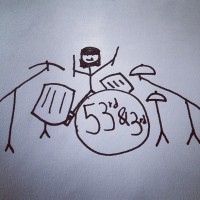Hops
|
Amount
|
Variety
|
Cost
|
Type
|
AA
|
Use
|
Time
|
IBU
|
Bill %
|
|
13 g |
Cluster13 g Cluster Hops |
|
Pellet |
5.2 |
Boil
|
60 min |
9.26 |
15.3% |
|
17 g |
wgv17 g wgv Hops |
|
Pellet |
5 |
Boil
|
60 min |
11.65 |
20% |
|
35 g |
Target35 g Target Hops |
|
Pellet |
9.5 |
Boil
|
5 min |
9.08 |
41.2% |
|
20 g |
Cluster20 g Cluster Hops |
|
Pellet |
5.2 |
Boil
|
5 min |
2.84 |
23.5% |
|
85 g
/ $ 0.00
|
Hops Summary
|
Amount
|
Variety
|
Cost
|
IBU
|
Bill %
|
|
33 g |
Cluster (Pellet) 33 g Cluster (Pellet) Hops |
|
12.1 |
38.8% |
|
17 g |
wgv (Pellet) 17 g wgv (Pellet) Hops |
|
11.65 |
20% |
|
35 g |
Target (Pellet) 35 g Target (Pellet) Hops |
|
9.08 |
41.2% |
|
85 g
/ $ 0.00
|
Mash Guidelines
|
Amount
|
Description
|
Type
|
Start Temp
|
Target Temp
|
Time
|
|
|
|
Infusion |
-- |
67 °C |
80 min |
Starting Mash Thickness:
3 L/kg
|
Target Water Profile
London (Porter, dark ales)
Notes
Posso colocar um pouco no chips ao rum...
RELER A PARTE DA ÁGUA: https://byo.com/bock/item/1260-practical-porter
Mash in at a higher temperature to leave more unfermentable sugars in the wort. This gives the beer a sweeter porter profile.
Astringency
Beers containing more dark grains are more likely to have some astringency in them. This is because darkly-roasted malts give up their tannins a bit easier in the mash. In a dark beer like a porter, adding less dark malt really isn’t an option. So, it pays to keep two things in mind. First, if you don’t oversparge, you probably won’t get an excessive amount of astringency, even in the darkest porter. Monitor your final runnings and don’t let them drop below SG 1.010 (or rise above a pH of 5.8, if you have a pH meter). Also, you can cool down and taste little samples of your runnings as you direct them to your kettle. Once the runnings start to have a puckering, drying sensation to them, stop collecting wort.
Mashing and Steeping
For all-grain brewers, a single infusion mash is all that is required for a porter. For a “rounder,” full-bodied brew, mash between 152 °F (67 °C) and 156 °F (69 °C). Mash out to 168 °F (76 °C) when the mash is done to (mostly) stop enzymatic activity. In addition, there’s absolutely no reason to extend your mash beyond the point in which an iodine test shows that all the starches are converted.

Last Updated and Sharing

- Public: Yup, Shared
- Last Updated: 2017-11-07 22:21 UTC
For quick copying and pasting to a text based forum or email.
Click the Download as HTML file button below.
Recipe costs can be adjusted by changing the batch size. They won't be saved but will give you an idea of costs if your final yield was different.
|
Cost $ |
Cost % |
| Fermentables |
$ |
|
Steeping Grains
(Extract Only) |
$ |
|
| Hops |
$ |
|
| Yeast |
$ |
|
| Other |
$ |
|
| Cost Per Barrel |
$ 0.00 |
|
| Cost Per Pint |
$ 0.00 |
|
| Total Cost |
$ 0.00 |
|
Discussion about this recipe:
